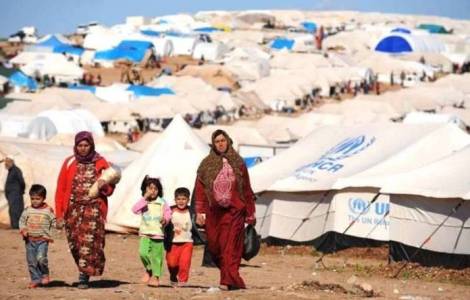
onuitalia.com
Baghdad (Agenzia Fides) - In Iraq, efforts are being made to close refugee camps and return internally displaced people to their respective regions of origin. However, the positive results already announced by the Iraqi political authorities are controversial. The Chaldean Christian Evan Faeq Yakoub Jabro, who is currently head of the Iraqi Ministry of Immigration and Refugees, is responsible for the plan to close the refugee camps (see Fides, 8/6/2020). In a recent interview with al Monitor, Evan Jabro reported that "of 76 displacement camps that were set up before the formation of the current government, only 29 are still open". All facilities are to be closed by the end of the year. According to official government sources, at least 66,000 Iraqi internally displaced persons have returned to their homes in the past few months. Criticism is above all of the methods of closing the camps: the "guests" were urged to return to the areas from which they fled. Evan Jabro continues to repeat in interviews and official statements that the resettlement of refugees to their areas of origin takes place in cooperation with the local authorities and always on a voluntary basis. Aid and health protection measures for those who remain in refugee camps have also been strengthened. Meanwhile, groups of refugees are reporting that after the closure of the Habbaniyah camp in the Nineveh province, hundreds of families have become homeless and that no concrete option has yet been offered to find alternative accommodation. In November, the plan presented by the Baghdad government called for the closure of all refugee camps across the country by March 2020. However, implementing the plan proved far from easy, and the temples have lengthened. In many refugee camps there are internally displaced people who have fled the northern Iraqi regions that fell under the rule of the self-proclaimed Islamic State (IS) in 2014. The government's will to close the camps also arises from economic and health needs - not least in connection with the Covid-19 pandemic - and public policy requirements. Difficulties in implementing the plan can in some cases also be traced back to the resistance of refugees who do not want to return to their respective regions of origin, where they can hardly imagine a peaceful future for their families in view of the continuing insecurity and lack of work. Evan Jabro, who was commissioned by the Iraqi government in June 2020 to deal with the migration emergency and the relocation of internally displaced persons, is a lecturer in biology and has distinguished herself in the past for his particular attention to the social needs of the younger generations, which normally neglected by Iraqi politics. In the past, Evan Jabro worked with the NGO Al-Firdaws, founded by Fatima Al-Bahadly in 2003, and was involved in the development of social and work projects aimed primarily at women and young people. The minister was also an adviser to the governor of Mosul on minority issues, and in the Iraqi political elections in May 2018 she ran for one of the five seats reserved for Christian minorities. (GV) (Agenzia Fides, 19/1/2021)
 ASIA/SYRIA - An office opened in Raqqa to "protect" the properties of Christians in north-east Syria
ASIA/SYRIA - An office opened in Raqqa to "protect" the properties of Christians in north-east Syria